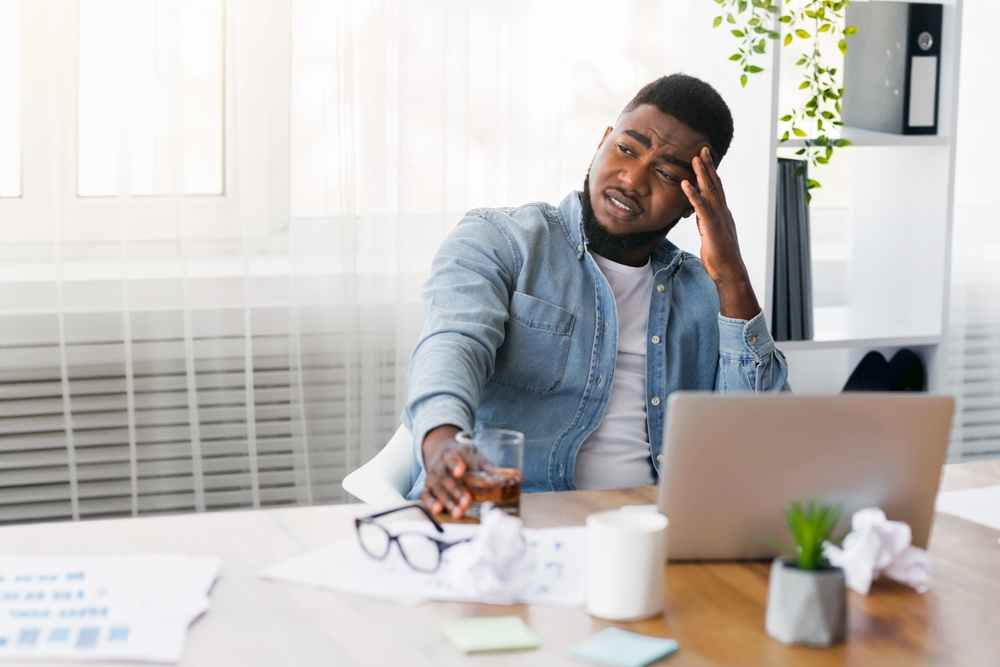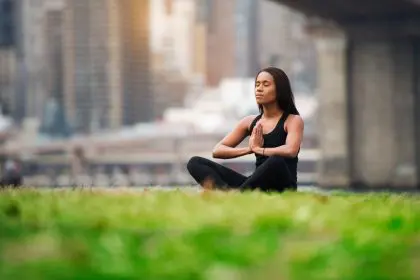Ever woken up after a night of drinking with not just a pounding headache, but also a racing mind filled with worry and regret? You’re experiencing what experts call “hangxiety,” a mashup of hangover and anxiety that’s becoming increasingly recognized as a genuine health concern. For those already dealing with anxiety or depression, this post-drinking phenomenon can be particularly challenging.
What’s really happening in your anxious brain
The relationship between alcohol and anxiety is more complex than you might think. When you first start drinking, alcohol acts like a chemical comfort blanket, cozying up to your brain’s GABA receptors and creating that familiar relaxed feeling. It’s why that first drink often feels like it’s melting your stress away. However, your brain is quietly orchestrating a series of chemical changes that will come back to haunt you the next day.
As the night progresses, alcohol begins stimulating your glutamate receptors, essentially hitting your brain’s excitement button. This stimulation, combined with disrupted sleep patterns, creates the perfect storm for anxiety to flourish the following day. Your brain, already dealing with the physical effects of dehydration and toxin processing, now has to manage this chemical imbalance that manifests as racing thoughts and overwhelming worry.
Why some people get it worse than others
For individuals who already experience anxiety or depression, hangxiety can feel particularly intense. The reason lies in how alcohol affects their already sensitive nervous systems. While everyone might experience some level of post-drinking anxiety, those with existing mental health conditions often find their symptoms amplified significantly during the hangover period.
Understanding hangxiety is crucial because it can create a dangerous feedback loop. Some people might be tempted to drink again to alleviate their anxiety symptoms, leading to a cycle that becomes increasingly difficult to break. This pattern can be especially problematic as alcohol dependency can develop, making anxiety symptoms progressively worse over time.
Natural ways to calm your anxious mind
When hangxiety strikes, self-compassion becomes your most powerful tool. Remember that those feelings of guilt and shame are temporary and often amplified by your body’s physical state. Instead of beating yourself up, focus on gentle self-care practices that can help both your body and mind recover.
One of the simplest yet most effective ways to combat hangxiety is proper hydration. Alcohol acts as a diuretic, leaving your body and brain dehydrated. Replenishing fluids isn’t just about drinking water, though that’s important. Sports drinks or bouillon soup can help restore essential electrolytes that your body needs to function properly.
Managing the physical symptoms
When it comes to pain relief, choose your medications wisely. While it might be tempting to reach for whatever’s in your medicine cabinet, avoid acetaminophen as it can strain your already-taxed liver. Instead, opt for ibuprofen or aspirin to help manage those physical symptoms that can make anxiety feel worse.
Relaxation techniques can be particularly effective in managing hangxiety. Deep breathing exercises, meditation, gentle yoga, or tai chi can help calm your nervous system and reduce anxiety levels. These practices not only help with immediate symptom relief but can also build resilience for future stress management.
Prevention strategies that actually work
The most effective way to prevent hangxiety is through mindful drinking habits. Consider limiting yourself to one or two drinks per night and make hydration a priority by alternating alcoholic beverages with water. Choosing drinks with lower alcohol content or diluting your drinks can also help you maintain better control over your consumption.
Creating sustainable drinking habits isn’t just about counting drinks. It’s about understanding your personal triggers and limits. Some people find that certain types of alcohol are more likely to trigger anxiety symptoms. Pay attention to these patterns and adjust your choices accordingly.
When to seek professional support
If you find yourself regularly experiencing severe hangxiety that disrupts your daily life, it might be time to consult a healthcare provider. They can help assess whether you’re dealing with underlying anxiety or depression and provide guidance on healthy approaches to alcohol consumption.
Understanding your relationship with alcohol
Managing hangxiety effectively often requires a honest look at your relationship with alcohol. This doesn’t necessarily mean you need to stop drinking entirely, but understanding how alcohol affects your mental health can help you make more informed decisions about your consumption.
The connection between alcohol and anxiety is clear, but that doesn’t mean you’re powerless against hangxiety. By understanding its causes and implementing effective management strategies, you can better navigate those post-drinking feelings of anxiety and worry. Remember, seeking help isn’t a sign of weakness, it’s a step toward better mental health and more enjoyable social experiences.
Most importantly, be patient with yourself as you develop healthier habits. Recovery from hangxiety isn’t just about treating the symptoms, it’s about creating a more balanced approach to drinking that aligns with your mental and physical wellbeing.
















